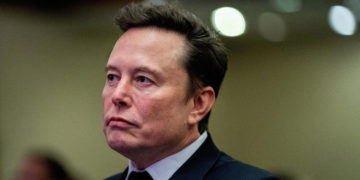Elon Musk, the world’s richest man and a close adviser to President-elect Donald J. Trump, weighed in on Germany’s election via social media on Friday, apparently endorsing the far-right Alternative for Germany.
“Only the AfD can save Germany,” Mr. Musk posted to X, referring to the anti-immigrant party by its German initials.
His post was in response to an English-language video posted by a 24-year-old German far-right influencer, Naomi Seibt. She harshly criticized Friedrich Merz, whom polls show leading the race, for dismissing a rival’s suggestion that Germany look to Mr. Musk and another firebrand, President Javier Milei of Argentina, for ideas about reforming the country.
Ms. Seibt also criticized Mr. Merz for ruling out joining any coalition with the AfD. Elements of that once-fringe party, including its entire youth wing, have been classified as “confirmed extremist” by German domestic intelligence. But its ethnonationalist and Islamophobic message has proved to be a strong vote-getter at the local level, especially in the more economically disadvantaged former East Germany.
Mr. Musk’s post, which had more than 25 million views in roughly 10 hours, comes as Germany begins what promises to be an aggressive election campaign. The country has an early election on Feb. 23 because Chancellor Olaf Scholz’s three-party coalition collapsed in November.
Like all the mainstream German parties, Mr. Merz’s center-right Christian Democratic Union has ruled out working with the AfD, which Mr. Scholz and others have called a threat to German democracy.
News that members of the AfD attended a secret meeting with the Austrian extreme-right provocateur Martin Sellner, who has called for deporting migrants en masse, led to large protests early this year. Then, starting in May, a leading light of the party was twice given a hefty fine for using Nazi-era slogans during campaign stops.
Last month in the eastern state of Saxony, police arrested eight people suspected of being members of what they called a right-wing extremist terrorist organization, which they said had been plotting to overthrow the government. Three of the eight were AfD members; one was an elected local official.
The online endorsement from Mr. Musk garnered a quick response from Alice Weidel, the AfD’s top candidate. “Yes! You are perfectly right,” she posted just an hour after Mr. Musk’s post went up.
Mr. Musk has long made heavy use of X, which he bought in 2022, to express his views on politics in the United States and abroad.
In Britain, he has thrown his weight behind another insurgent, anti-immigrant party, Reform U.K., which is led by the longtime political disrupter Nigel Farage. He met on Monday with Mr. Farage and the party’s new treasurer, Nick Candy, at Mr. Trump’s Florida estate, Mar-a-Lago, to discuss the possibility a donation by Mr. Musk to Reform U.K.
Mr. Musk has yet to write Mr. Farage a check, and lawmakers in Britain are calling on the government to tighten campaign-finance laws to restrict foreign donations. But he has left little doubt of his endorsement.
When Mr. Farage posted a photo of himself with Mr. Candy and Mr. Musk posing in front of a portrait of a younger Mr. Trump, along with the line “Britain needs Reform,” Mr. Musk replied, “Absolutely.”
He also has picked repeated fights online with Britain’s Labour government, accusing it of using police-state tactics in going after people who used his X platform to spread misinformation after anti-immigrant riots broke out across Britain last summer, following a mass stabbing at a dance studio.
Mr. Musk claimed that “civil war” was inevitable in Britain. After Prime Minister Keir Starmer activated an emergency plan to relieve pressure on overcrowded jails, under which defendants can be held longer in cells until space opens in prisons, Mr. Musk posted, “The U.K. is turning into a police state.”
In Germany, Christian Lindner, the leader of the small, pro-business Free Democratic Party, suggested this month that the country should look toward Mr. Musk and Mr. Milei when thinking about disruption and reform.
In her crudely edited video message on X, Ms. Seibt criticized Mr. Merz’s opposition to that idea as well as his repeated vow not to work with the AfD.
The AfD is polling at 19 percent, and its leaders appeared ready to make the most of the post, apparently hoping that it could help attract more voters and serve as a jumping-off point for communications with the Trump White House.
Some hours after her initial post, Ms. Weidel recorded a video addressing Mr. Musk’s tweet. “The Alternative for Germany is indeed the only alternative for our country; our very last option,” she said.
On Friday, Mr. Lindner also addressed Mr. Musk over X: “Elon, I’ve initiated a policy debate inspired by ideas from you and Milei,” he said, explaining why Mr. Musk should not endorse the AfD. “Don’t rush to conclusions from afar.”
The post Musk Expresses Support for Far-Right Party in Germany’s Election appeared first on New York Times.


















